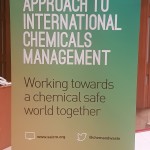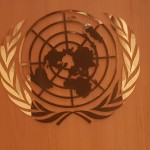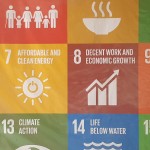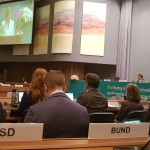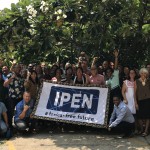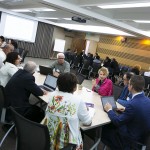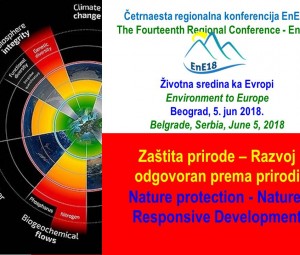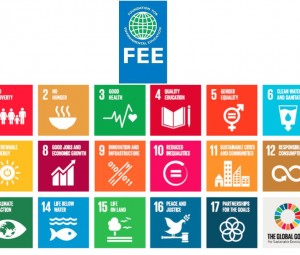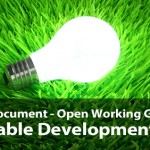EASD is participating in Shaping the future beyond 2020
At the United Nations Conference Centre in Bangkok, Thailand, from 1 to 4 October 2019, EASD Honorable President participate at IP3 – The Intersessional Process 3 on Strategic Approach and sound management of chemicals and waste (SAICM) beyond 2020 , and technical briefings held on 30 September 2019, as well as IPEN preparatory meetings on 28 and 29 September.
This is the opportunity to engage in a forum that will determine what key strategies and priorities that will be taken by all IP3 SAICM delegates. Focus are themes: Enabling framework as an umbrella adopted at ICCM5 and ensure high-level political endorsement, Governance and institutional arrangement, Financing SAICM with more contributions from the industry sector and Leading indicators for new SAICM should be outcome oriented rather than process oriented.
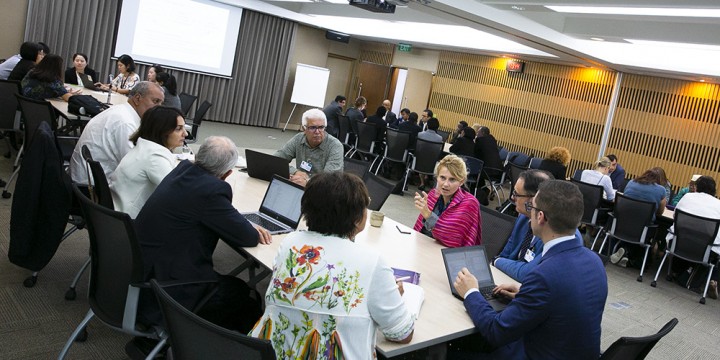
Relevant SDGs goals are: SDG2 – Zero hunger, SDG3 – Good health and well-being, SDG5 – Gender equality, SDG6 – Clean water and sanitation, SDG8 – Decent work and economic growth, SDG11 – Sustainable cities, SDG12 – Sustainable Consumption and Production, SDG14 – Life below water, SDG15 – Life on land, SDG16 – Peace, justice and strong institutions and SDG17 – Partnerships for the goal.
Join us for June 5th: Conference Agenda is available
Pictures from the event:
Otvaranje / Opening
Panel o zastiti prirode / Panel on Nature Protection
UNEP nagrade / UNEP@WED
YRE awwards/ Nagrade Mladih ekoreportera & https://www.facebook.com/mladiekoreporteri/
Prezentacija radova / Presentations
The Fourteenth Regional Conference – EnE18
Environment to Europe
Belgrade, Serbia, June 5, 2018
Nature protection – Nature-Responsive Development
Conference Agenda, draft, as on 22/05/2018
Conference “Environment to Europe” – EnE18 is an official event that marks the UN World Environment Day (WED) in the Republic of Serbia and region. Since its beginning in 1974, World Environment Day has developed into a global platform for raising awareness and taking action on urgent issues from marine pollution and global warming to sustainable consumption and wildlife crime. “Beat Plastic Pollution”, the theme for World Environment Day 2018, is a call to action for all of us to come together to combat one of the great environmental challenges of our time. Chosen by this year’s host, India, the theme of World Environment Day 2018 (If you can’t reuse it, refuse it) invites us all to consider how we can make changes in our everyday lives to reduce the heavy burden of plastic pollution on our natural places, our wildlife – and our own health. In recent years, millions of people have taken part in thousands of registered activities worldwide.
Conference “Environment to Europe” – EnE18 is an official event that marks the European Sustainable Development Week (ESDW) in the Republic of Serbia. The ESDW is a European-wide initiative to stimulate and make visible activities, projects and events that promote sustainable development and the Sustainable Development Goals (SDGs). It takes place every year from 30 May until 5 June. The ESDW aims to raise awareness for the 2030 Agenda in Europe and calls upon local stakeholders to actively engage with sustainable development, in general, and the SDGs, in particular.
The Fourteenth Regional Conference EnE18 is thematically focused on Nature protection – Nature-Responsive Development (2018). Since 2005, when we established the Conference, we have around 2.500 participants from 15 countries and presented about 350 research and scientific papers. This year is also fourteen years of partnership between “Environmental Ambassadors for Sustainable Development“ with the Chamber of Commerce and Industry of Serbia“.
Conference Agenda
as on 22/05/2018; possible changes of Agenda when confirmation received
5. jun June 5th
| Velika sala u PKS, II sprat, Terazije 23, Beograd | Main Hall, 2nd floor – Serbian Chamber of Commerce, Terazije 23, Belgrade |
9:00 – 10:00 Registracija učesnika / Registration
10:00 – 10:50 Uvodna obraćanja / Opening remarks
Moderator: dr Uroš Rakić, on behalf of organisators
- H.E. Ratko Vlajkov, Ambassador, Embassy of the Republic of Bulgaria in the Republic of Serbia – The Bulgarian presidency of the Council of the EU / Ambasador, Ambasada Republike Bugarske u Republici Srbiji
- H.E. Lazar Mirkić, Ambassador, Embassy of Bosnia and Herzegovina in the Republic of Serbia / Ambasador, Ambasada Bosne i Hercegovine u Republici Srbiji
- Robert Nygård, The First Secretary Responsible for Environmental Issues, Swedish Embassy in the Republic of Serbia / Prvi sekretar odgovoran za pitanja životne sredine, Ambasada Švedske u Republici Srbiji
- Delegation of EU in Serbia, representative / Delegacija EU u Srbiji, predstavnik/ (potvrđeno/confirmed, representative tbd)
- Minister for Environment / Ministar za zaštitu životne sredine (invited/pozvan)
- Stanojla Mandić, Deputy Commissioner for Information of Public Importance and Personal Data Protection of the Republic of Serbia / Zamenica poverenika za informacije od javnog značaja i zaštitu podataka o ličnosti Republike Srbije
- Dr Deni Porej, Director of WWF Adria, WWF Mediterranean Programme Office / Direktor WWF Adria, WWF Regionalna kancelarija
- Aleksandra Šiljić Tomić, Project Coordination Specialist, UN Environment Republic of Serbia / Koordinator projekta, Kancelarija UN za životnu sredinu, Republika Srbija
- dr Nenad Sekulić, Head of Department for Biodiversity and Ecological Network, Institute for Nature Conservation of Serbia / Načelnik odeljenja za biodiverzitet i ekološke mreže, Zavod za zaštitu prirode Srbije
- Goran Krnčević, Assistant Director of the Sector for Legal, Financial and Administrative Affairs, Institute for Nature Conservation of Vojvodina Province / Pomoćnik direktora za pravne, finansijske i opšte poslove, Pokrajinski zavod za zaštitu prirode
- Ljubica Naumović, Environment Executive, Tetra Pak Production / referent za zaštitu životne sredine, Tetra Pak Production
- Dušan Stokić, Co-organizer of the EnE18 Conference, Head of the Department for Environment, Technical Regulation, Quality and Social Responsibility, the Chamber of Commerce and Industry of Serbia / suorganizator EnE18 Konferencije, Rukovodilac Službe za životnu sredinu, tehničke propise, kvalitet i društvenu odgovornost, Privredna komora Srbije
- prof. dr Dunja Prokić, the EnE18 Conference Chair person, Environmental Ambassadors for Sustainable Development / predsedavajuća EnE18 Konferencije, Ambasadorka održivog razvoja i životne sredine
10:50 – 11:00 Aleksandra Mladenović, Environmental Ambassadors for Sustainable Development President/ Predsednica Ambasadora održivog razvoja i životne sredine, Plenary, Panel Theme and Panelists / Predstavljanje plenarnog izlaganja, panela i panelista
11:00 – 11:20 Plenary lecture / Plenarno predavanje
Begona Matilla Soloaga, Human Dynamics, Team leader, TA for strengthening the National Nature Protection System for implementation of Natura 2000 requirements / Human Dynamics, tim lider, NATURA 2000 Turska. Focus : NATURA 2000 in Turkey – project outputs / NATURA 2000 u Turskoj – rezultati projekta.
11:20 – 13:30 Panel on Nature Protection and Nature – Responsive Development / Panel na temu Zaštita prirode i razvoj odgovoran prema prirodi
Moderator: Milica Momčilović, journalist, Vice President of World Federation of Science Journalists (WFSJ) / novinar, potpredsednica Svetske federacije naučnih novinara
Panelists (Plenary Session) / Učesnici Panela (Plenarna sesija) :
dr Deni Porej, Director of WWF Adria, WWF Mediterranean Programme Office / Direktor WWF Adria, WWF Regionalna kancelarija. Focus : WWF and Nature Protection, Nature – Responsive Development / WWF i zaštita prirode, razvoj odgovoran prema prirodi.
prof. dr Predrag Simonović, Faculty of Biology, University of Belgrade / Biološki fakultet, Univerzitet u Beogradu . Focus: An invasive species of fish and links between fisheries management and aquaculture in Serbia in the process of EU accession / Invazivne vrste riba i veza između ribolovnog upravljanja i akvakulture u Srbiji u procesu pristupanja EU
mr. Danko Jović, Institute for Nature Conservation of Serbia / Zavoda za zaštitu prirode Srbije. Focus: State in the Republic of Serbia in respect of nature and oblidations of Serbia in the process of accession to the EU in this area / Stanje u Republici Srbiji u vezi zaštite prirode i obavezama Srbije u procesu pristupanja EU u ovoj oblasti.
Klara Sabadoš, Institute for Nature Conservation of Vojvodina Province / Pokrajinski zavod za zaštitu prirode. Focus: The situation regarding nature protection and the NATURA 2000 network in Serbia / Situacija oko zaštite prirode i mreže NATURA 2000 u Srbiji.
Nikola Stanojević, Bird Protection and Study Society of Serbia / Društvo za zaštitu i proučavanje ptica: Protection of birds and obligations of the Republic of Serbia in the process of EU accession in this area / Zaštita ptica i obaveze Republike Srbije u procesu pristupanja EU u ovoj oblasti.
13:30 – 13:40 Technical Break / Tehnička pauza
13:40 -14:00 Awards for the winners of the competition „Beat plastic pollution! If you can’t reuse it, refuse it!“ organized among elementary school classes by UN Environment and partners: Environmental Ambassadors for Sustainable Development and Forestry and Environmental Action for celebration of the World Environment Day 2018 in Serbia / Dodela nagrada timovima iz osnovnih škola u Srbiji, pobednicima na konkursu „U koštac sa plastikom!“ tj. „Pobedi zagađenje plastikom! Ako ne možeš da je ponovo upotrebiš, ne koristi je!“ koji je Agencija Ujedinjenih nacija za životnu sredinu organizovala zajedno sa partnerima: Ambasadori održivog razvoja i zaštite životne sredine i Inicijativa za šumarstvo i životnu sredinu – fea povodom obeležavanja Svetskog dana zaštite životne sredine 2018. u Srbiji.
Obraćanje: Aleksandra Šiljić Tomić, specijalista za koordinaciju projekata Agencije Ujedinjenih nacija za životnu sredinu (UN Environment)
Awarded / Nagrađeni radovi:
1. mesto – rad „Žutoplovac“, OŠ „Sveti Georgije“, Uzdin; Nagradu prima mentor Tatjana Romanov, profesor razredne nastave
2. mesto – rad „Eko brodić – Drugarstvo“, OŠ „Rade Dodić“, Milutovac, izdvojeno odeljenje Poljna; Nagradu prima mentor Suzana Jovanović –Stanisavljević
3. mesto – rad „Brod prijateljstva“, OŠ „Petefi brigada“, Kula; Nagradu prima mentor Marijana Kolarić
Photo exhibition – slideshow of vessels (ships, sailboats, etc.) of all elementary school classes participated in the competition is presented in the front of the Main Hall.
14:00 – 14:20 Awards for the best Young Reporters for the Environment (YRE) in 2018: “Energy Efficiency of the Eyes of Young Reporters for the Environment” / Dodela nagrada najboljim Mladim Eko-reporetima u 2018. godini: “Energetska efikasnost očima Mladih Eko-reportera”
Obraćanje: Dijana Šarac, koordinator Programa Mladi Eko-reporteri
Awarded/ Nagrađeni radovi:
Uzrasna kategorija od 11 do 14 godina
– U kategoriji članaka:
- mesto David Bradić iz OŠ „Rade Dodić“, Milutovac, naziv članka: Sunce i ti
- mesto Lena Veličić, Dunja Milijanović iz OŠ „Sveti Sava“, Čačak, naziv članka: Štednja energije
- mesto Milica Đurić, Teodora Nikša, Milica Popović, Živojin Mišić, Marko Kuleško iz OŠ „Marija Trandafilović“, Veternik, naziv članka: Udaljenost Kejptauna je relativna stvar
– U kategoriji fotografija:
- mesto Milan Pavlović iz OŠ Stojan Novaković, Blace, naziv fotografije: Energetska efikasnost saradnjom svih nas
- mesto Jovana Dimitrijević iz OŠ Sveti Sava, Pirot, naziv fotografije: Moj grad vodi računa o energetskoj efikasnosti
- mesto Ilija Radojković iz OŠ Ratko Mitrović, Čačak, naziv fotografije: Sunce na našem krovu
– U kategoriji videa:
- mesto Đina Ranđelović, Iva Ignjatović iz OŠ „Sveti Sava“ Pirot, naziv videa: Unutrašnji bazen u Pirotu
- mesto Nikola Dragić, Ognjen Kostić, Aleksa Vacić, Dimitrije Stanković iz OŠ „Sveti Sava“, Pirot, naziv videa: Vodenica
- mesto Strahinja Marseni, Anja Lazović, Vladimir Konstantinovića, Andreja Đurkovića, Teodora Radivojević iz OŠ Drinka Pavlović, Beograd, naziv videa: Energetska efikasnost
Uzrasna kategorija od 15 do 18 godina
– U kategoriji članaka:
- mesto Jefimija Najdić iz Gimnazija Vranje, naziv članaka: Dozvolite plućima naše planete da dišu
- mesto Marija Dibrani iz MTŠ „14 oktobar“, Kraljevo, naziv članka: Zelena energija i zdrav život
- mesto Stefan Zeremski, Bojan Zakonović, Vasilije Radović iz ETŠ „Rade Končar“, Beograd. Naziv članka: Sekcija za energetsku efikasnost
– U kategoriji fotografija:
- mesto Olga Đurović iz Gimnazije „Takovski ustanak“, Gornji Milanovac, naziv fotografije: Krov
- mesto Vladana Stanković iz Prehrambeno-hemijske škole, Niš, naziv fotografije: Nova rasveta u Doljevcu
– U kategoriji videa:
- mesto Anja Aranđelović, Milica Jovanović, Gordan Mišić iz Tehničke škole, Paraćin, naziv videa: Menjamo navike da ne bude panike
- mesto Natalija Stanković iz Savremene gimnazije, Beograd, naziv videa: Energetska efikasnost
- mesto 14 učenika iz Medicinske škole, Vranje, naziv videa: Odakle dolazi električna energija
– Uzrasna kategorija od 19 do 21 godine
U kategoriji fotografija:
- mesto Tijana Krnjaić sa Fakulteta Političkih nauka, naziv fotografije: Toplotna pumpa
– U kategoriji videa:
1.mesto Anđela Stošić sa Fakulteta Političkih nauka, naziv videa: Solarni paneli
14:20-15:00 Break / Pauza
15:00-18:00 Presentations / Usmena izlaganja radova
Moderatori: prof. dr Hristina Stevanović Čarapina, prof. dr Nataša Žugić Drakulić, prof. dr Dunja Prokić, dr Uroš Rakić
Plenary lecture / Uvodno predavanje
Uticaj Sporazuma iz Pariza o promeni klime na razvoj ekološkog acquis-a i prenošenje pravnih standarda zaštite biodiverziteta i očuvanja šuma u pravni sistem Srbije, MIRJANA DRENOVAK IVANOVIĆ, PRAVNI FAKULTET, UNIVERZITET U BEOGRADU
Oral presentations / Usmena izlaganja
GEOGRAPHIC MONITORING OF FOREST BIODIVERSITY IN BOSNIA AND HERZEGOVINA, ADI OPERTA, Department of Geography, Faculty of Science, University of Sarajevo, Bosnia and Herzegovina, Mujo Hasanović, Irma Mahmutović-Dizdarević, Department of Biology, Faculty of Science, University of Sarajevo, Bosnia and Herzegovina
KREIRANJE GIS BAZE O STANJU REČNOG TOKA U FUNKCIJI DIZAJNA ADEKVATNIH REŠENJA OČUVANJA PRIRODE, SLAĐANA ĐORĐEVIĆ, POLJOPRIVREDNI FAKULTET, UNIVERZITET U BEOGRADU, MILOŠ NINKOVIĆ, GEOGRAFSKI FAKULTET, UNIVERZITET U BEOGRADU, DUŠICA PEJIĆ, FAKULTET BEZBEDNOSTI, UNIVERZITET U BEOGRADU, BORIS KATIĆ, OPŠTINA MALI ZVORNIK, SLOBODAN MILOŠEVIĆ, FAKULTET ZA PRIMENJENU EKOLOGIJU FUTURA, UNIVERZITET SINGIDUNUM
CLADOCERANS SEASONAL DYNAMICS AT SNR ”CARSKA BARA”, Martina Mezei, Aleksandra Petrović, Vojislava Bursić, Tijana Stojanović, Jasna Grabić, Branka Ljevnaić-Mašić, FACULTY OF AGRICULTURE, UNIVERSITY OF NOVI SAD, SERBIA
PREGLED VRSTA PRIORITETNIH ZA NATURU 2000 U FAUNI ZASAVICE, MIHAJLO STANKOVIĆ, pOKRET GORANA SREMSKA MITROVICA
PRILOG FAUNI KIČMENJAKA N.P. KOZARA – MEĐUNARODNO ZNAČAJNE VRSTE, Mihajlo Stanković, Pokret gorana Sremska Mitrovica, Dragan Romčević, NACIONALNI PARK KOZARA
ZAŠTITA PRIRODE U GRADU BEOGRADU, MILAN MARTINOVIĆ, GEOGRAFSKI FAKULTET, UNIVERZITET U BEOGRADU
INFLUENCE OF DROUGHT ON WATER QUALITY AT SPECIAL NATURE RESERVE “CARSKA BARA”, Radoš Zemunac, Jasna Grabić, Vojislava Bursić, Aleksandra Petrović, Martina Mezei, Faculty of Agriculture, University of Novi Sad, Ildiko Grnya, Special Nature Reserve “Carska bara”, Branka Ljevnaić-Mašić, Faculty of Agriculture, University of Novi Sad
ŠUME HRASTA LUŽNJAKA (Quercus Robur Lat.) – INDIKATOR KLIMATSKIH PROMENA NA PODRUČJU ŠUMADIJE, SEVERIN ŠIKANJA, FAKULTET ZA PRIMENJENU EKOLOGIJU – FUTURA, UNIVERZITET SINGIDUNUM
MERE ZAŠTITE U SPOMENIKU PRIRODE ”PARK BUKOVIČKE BANJE”, STEFAN dABIŽLJEVIĆ, ALEKSANDAR ĐORĐEVIĆ, MILOŠ TOMOVIĆ, VISOKA ŠKOLA STRUKOVNIH STUDIJA ARANĐELOVAC
ZAŠTITA PRIRODE U TEHNOLOŠKIM GRADOVIMA, MILAN MARTINOVIĆ, GEOGRAFSKI FAKULTET, UNIVERZITET U BEOGRADU
INVESTIGATION OF MACRO- AND MICROELEMENTS IN SOIL, GRAPEVINE AND AIR IN ORGANIC VINEYARD: BIOMONITORING, ECOLOGICAL IMPLICATIONS AND HEALTH RISK ASSESSMENT, TIJANA Milićević, Mira Aničić Urošević, INSTITUTE OF PHYSICS BELGRADE, NATIONAL INSTITUTE OF THE REPUBLIC OF SERBIA, UNIVERSITY OF BELGRADE, Dubravka Relić, fACULTY OF CHEMISTRY, UNIVERSITY OF BELGRADE, Gordana Vuković, INSTITUTE OF PHYSICS BELGRADE, NATIONAL INSTITUTE OF THE REPUBLIC OF SERBIA, UNIVERSITY OF BELGRADE, Sandra Škrivanj, AlekSANDAR POPOVIĆ, UNIVERSITY OF BELGRADE, FACULTY OF CHEMISTRY
PRIMENA LCA MODELA ZA DONOŠENJE ODLUKA U OBLASTI ZAŠTITE ŽIVOTNE SREDINE, jASNA STEPANOV, DUNJA PROKIĆ, FAKULTET ZAŠTITE ŽIVOTNE SREDINE, UNIVERZITET EDUKONS, SREMSKA KAMENICA
AIR POLLUTION TAKEN BY HEALTH PROFESSIONALS – CALL FOR PRACTICAL SOLUTIONS AND TANGIBLE CITY LEVEL POLICY CHANGES TO CUT POLLUTION LEVELS, VLATKA MATKOVIĆ PULJIĆ, Srđan kukolj, HEALTH & ENVIRONMENT ALLIANCE (HEAL), BRUSSELS, Marija jevtić, UNIVERSITY OF NOVI SAD, FACULTY OF MEDICINE, INSTITUTE OF PUBLIC HEALTH OF VOJVODINA, UNIVERSITÉ LIBRE DE BRUXELLES (ULB), SCHOOL OF PUBLIC HEALTH, BRUXELLES, CATHERINE BOULAND, UNIVERSITÉ LIBRE DE BRUXELLES (ULB), SCHOOL OF PUBLIC HEALTH, BRUXELLES, ALEXANDER SIMIDCHIEV, DEPARTMENT OF PULMONOLOGY, UNIVERSITY HOSPITAL LOZENETS, SOFIA
OSIGURANJE KAO FINANSIJSKI INSTRUMENT ODRŽIVOG RAZVOJA, TANJA NOVAKOVIĆ, FAKULTET TEHNIČKIH NAUKA, UNIVERZITET U NOVOM SADU, Marija jevtić, Medicinski fakultet, UNIVERZITET U NOVOM SADU, Institut za javno zdravlje Vojvodine, tatjana tamaš, MEDICINSKI FAKULTET, UNIVERZITET U NOVOM SADU, Institut za onkologiju vojvodine, Đorđe Ćosić , Ljiljana Popović, Mirjana Laban, FAKULTET TEHNIČKIH NAUKA, UNIVERZITET U NOVOM SADU
ELEMENTI MALOLETNIČKOG KRIMINALITETA U KRIVIČNIM DELIMA PROTIV ŽIVOTNE SREDINE U REPUBLICI SRBIJI, Aleksandar Luković, KORIDORI SRBIJE, Brankica Luković, Ljilana Plećević, Vahid Ibrulj, Visoka škola strukovnih studija-Aranđelovac
ZAŠTITA VAZDUHA OD ZAGAĐENJA I ”EURO 3” STANDARD MOTORNIH VOZILA, bRANISLAVA MARKOVIĆ, pRAVNI FAKULTET, UNIVERZITET U BEOGRADU
SRBIJA BEZ FOSILNIH GORIVA, DEJAN DOLJAK, STEVAN GLIGOROVIĆ, MILICA LAZOVIĆ,ĐURĐIJA MARKOVIĆ, ANA MILEUSNIĆ, MIRKO MILIĆEVIĆ, NEMANJA NIKOLIĆ, SINIŠA OBRENIĆ, DANIJELA PAVIĆEVIĆ, ĐORĐE SAMARDŽIJA, JEDAN STEPEN SRBIJA
UTICAJ TURIZMA NA VODNE RESURSE, SNEŽANA ŠTETIĆ, VISOKA TURISTIČKA ŠKOLA STRUKOVNIH STUDIJA BEOGRAD, IGOR TRIŠIĆ, Fakultet za hotelijerstvo i turizam, Univerzitet u Kragujevcu, Fakultet za hotelijerstvo i turizam u Vrnjačkoj BanjI
Značaj planova za sigurno vodosnabdevanje i Bonske povelje, mILKICA Kovačević
KREMIRANJE I ZAŠTITA ŽIVOTNE SREDINE, OSVRT NA SRBIJU I ”OGANJ”, SLOBODAN STOJANOVIĆ, BRANISLAV MATIJAS, MAJA NIKOLIĆ, UDRUŽENJE KREMATISTA ”OGANJ”
Poređenje ekološke svesti učenika osnovnih škola u Nemačkoj i Bosni i Hercegovini, TEA POŽAR, Institute of Geography, University of Bamberg, dIJANA ĐURIĆ, Građevinski fakultet Subotica, Univerzitet u Novom Sadu, LOLA MARKOVIĆ, GEOGRAFSKI FAKULTET, UNIVERZITET U BEOGRADU
Radovi u formi apstrakta
OČUVANJE STANIŠTA VELIKE DROPLJE, MIROSLAVA KRNIĆ, LJILJANA MILEKIĆ, gRADSKA UPRAVA, GRAD KIKINDA
Biodiversity of epiphytic Lichens and Mosses from Pčinja District and Bioindication of heavy Metal Pollution by using Evernia prunastri and Hypnum cupressiforme, SNEŽANA MILOŠEVIĆ, OPŠTINSKA UPRAVA, KLER, OPŠTINA BUJANOVAC, SLAVIŠA STAMENKOVIĆ, PRIRODNO MATEMATIČKI FAKULTET
18:00 Zatvaranje konferencije / Conference closing
Obraćanje: Aleksandra Mladenović, predsednica Ambasadora održivog razvoja i životne sredine
I ove godine Ambasadori održivog razvoja i životne sredine (AOR) nastavljaju sa promovisanjem aktivnosti koje imaju minimalan negativan uticaj na životnu sredinu, te je EnE18 Konferencija prepoznata kao ekološki prijateljska i izbegnuto je bespotrebno štampanje materijala i publikovanje Zbornika radova u štampanom izdanju. Takođe, AOR preporučuju dolazak učesnika na Konferenciju sredstvima javnog prevoza.
Četrnaesta regionalna konferencija EnE18
The Fourteenth Regional Conference EnE18
Životna sredina ka Evropi
Environment to Europe
ORGANIZACIONI I NAUČNO – RECENZENTSKI ODBOR:
ORGANISATION AND SCIENTIFIC – ADVISORY COMMITTEE:
dr Christos Vlachokostas, Aristotle University Thessaloniki, Greece
Prof. dr Anđelka Mihajlov, University of Novi Sad, Serbia
MSc Ljupco Avramovski, Skopje, FYR Macedonia
Prof dr Predrag Simonović, University of Belgrade, Serbia
Prof. dr Nataša Žugić Drakulić
Filip Jovanović MSc
dr Uroš Rakić
Prof. dr Hristina Stevanović Čarapina
MSc Aleksandra Mladenović
mr Dušan Stokić, ko-predsedavajući Konferencije, Conference co-Chair
prof. dr Dunja Prokić, glavna koordinatorka Konferencije, Main Conference Coordinator
Jezik Konferencije
Engleski i srpski (i/ili jezici bivših jugoslovenskih republika); simultano prevođenje je obezbeđeno zaključno sa 13:30h.
Conference language
English and Serbian (and/or languages of former Yugoslav Republics); simultaneous translation will be provided up to 13:30.
Zbornik radova
On-line Zbornik radova objavljenih u celini predstavlja radove koji su recenzirani, razvrstani i dostavljeni u predviđenom roku; autori radova su odgovorni za sadržaj radova i prevod na engleski jezik. Zbornik radova se može preuzeti sa: http://ambassadors-env.com/ene18-zbornik-radova-book-of-proceedings/
Book of Proceedings
Book of Proceedings, with all accepted papers, is available online. Authors are responsible for content and English translation of their papers. Available at: http://ambassadors-env.com/ene18-zbornik-radova-book-of-proceedings/
Recenzentski odbor je, na bazi tematske usmerenosti i načina prezentovanja, razvrstavao radove za Zbornik po kategorijama: radovi u celini i apstrakti radova. Papers are grouped in two categories: full papers and abstracts.
Kontakt: “Ambasadori održvog razvoja i životne sredine”, www.ambassadors-env.com; Email: eneconference@feeserbia.com, cc: office@ambassadors-env.com
Contact: „Environmental Ambassadors for Sustainable Development“, www.ambassadors-env.com; Email: eneconference@feeserbia.com, cc: office@ambassadors-env.com
Call for participation for EnE18: Nature protection – Nature-Responsive Development
We are pleased to invite you to The Fourteenth Regional Conference ”Environment to Europe – EnE18‘‘, which will be held on June 5th 2018 in Belgrade (Chamber of Commerce and Industry of Serbia). Conference is UN WED (World Environmental Day) and ESDW (European Sustainable Development Week) event. On the World Environment Day 2018 , the UN is expected to give emphasis on the fact that individual actions to preserve the nature can actually help in sustaining a green environment and to understand why forests are important.
Environmental Ambassadors for Sustainable Development in partnership with Chamber of Commerce and Industry of Serbia organize The Fourteenth Regional Conference ”Environment to Europe – EnE18”. Thematic area this year is Nature protection – Nature-Responsive Development
Nature protection is highly ranked on the list of priorities of the United Nations (Sustainable Development Goal 15 and UN Decade on Biodiversity by 2020), the European Union (NATURA 2000) and all countries that strive to preserve natural values, biodiversity, geodiversity have to develop with responsibility to nature. The goal of the UN Decade on Biodiversity is to support the implementation of the Strategic Plan for Biodiversity and to promote its overall vision of living in harmony with nature. UN SDG 15 refers to the protection, restoration and promotion of sustainable ecosystems use, sustainable forests management, combating desertification and preventing land degradation and biodiversity loss. In response to the threat to nature and biodiversity, the EU has formed a wide European network of protected natural areas, known as NATURA 2000. It covers over 18% of the EU territory, ensuring long-term survival of the most valuable and threatened species and habitats in Europe. Candidate countries and potential candidates for membership in the European Union are facing a great challenge to protect nature and implement a development responsive to nature.
The aim of the EnE18 Conference is to highlight the importance of environmental protection and sustainable development in the context of the protection of nature. The Conference is an opportunity for representatives of state institutions, professional, consultative, educational and scientific institutions, managers of protected areas, civil sector, to present current topics in the field of nature protection.
Traditionally, within the Conference every year we have a significant number of participants from Serbia and abroad, the participation of over 150 authors and co-authors of papers who published in the CD Proceedings of the Conference, as well as participants without paper.
We firmly believe that your scientific/research results/consultancy/views and experience will substantially help a better understanding of these fields. Being aware of the necessity of a close cooperation between science and practice, we invite you to take active participation in the Conference Environment to Europe – EnE18, either by preparing and presenting your paper or by contributing as an auditor and participant.
Application forms (with or without paper) should be sent by email: eneconference@feeserbia.com
Focus themes on WED through years:
- Theme of the year 2017 – “Join the race to make the world a better place”.
- Theme of the year 2015 – “One World, One Environment”.
- Theme of the year 2014 – “small island developing states” or “SIDS” and “Raise your voice, not the sea level”.
- Theme of the year 2013 – “Think. Eat. Save.” And slogan – “Reduce Your Foodprint”.
- Theme of the year 2012 – “Green Economy: Does it include you?”.
- Theme of the year 2011 – “Forests: Nature at your Service”.
- Theme of the year 2010 – “Many Species. One Planet. One Future”.
- Theme of the year 2009 – “Your Planet Needs You – Unite to Combat Climate Change”.
- Theme and slogan of the year 2008 – “CO2, Kick the Habit – Towards a Low Carbon Economy”.
- Theme of the year 2007 – “Melting Ice – a Hot Topic?”.
- Theme of the year 2006 – “Deserts and Desertification” and slogan – “Don’t Desert Drylands!.”
- Theme of the year 2005 – “Green Cities” and slogan – “Plan for the Planet!”.
- Theme of the year 2004 – “Wanted! Seas and Oceans” and slogan – “Dead or Alive?”.
- Theme of the year 2003 – “Water” and slogan – “Two Billion People are Dying for It!”.
- Theme of the year 2002 – “Give Earth a Chance”.
- Theme of the year 2001 – “Connect with the World Wide Web of Life”.
- Theme of the year 2000 – “The Environment Millennium” and slogan – “Time to Act”.
- Theme of the year 1999 – “Our Earth – Our Future” and slogan – “Just Save It!”.
- Theme of the year 1998 – “For Life on Earth and slogan – “Save Our Seas”.
- Theme of the year 1997 – “For Life on Earth”.
- Theme of the year 1996 – “Our Earth, Our Habitat, Our Home”.
- Theme of the year 1995 – “We the Peoples: United for the Global Environment”.
- Theme of the year 1994 – “One Earth One Family”.
- Theme of the year 1993 – “Poverty and the Environment and slogan – “Breaking the Vicious Circle”.
- Theme of the year 1992 – “Only One Earth, Care and Share”.
- Theme of the year 1991 – “Climate Change. Need for Global Partnership”.
- Theme of the year 1990 – “Children and the Environment”.
- Theme of the year 1989 – “Global Warming; Global Warning”.
- Theme of the year 1988 – “When People Put the Environment First, Development Will Last”.
- Theme of the year 1987 – “Environment and Shelter: More Than A Roof”.
- Theme of the year 1986 – “A Tree for Peace”.
- Theme of the year 1985 – “Youth: Population and the Environment”.
EASD activities related SDGs
EASD team , from January 1,2018 will follow activities through SDGs lenses:
SD GOAL 1 – No Poverty SD GOAL 2 – Zero Hunger SD GOAL 3 – Good Health and Well-Being SD GOAL 4- Quality Education SD GOAL 5 – Gender Equality SD GOAL 6 – Clean Water and Sanitation SD GOAL 7 – Affordable and Clean Energy SD GOAL 8 – Decent Work and Economic Growth SD GOAL 9 – Industry, Innovation and Infrastructure SD GOAL 10 – Reduced Inequalities SD GOAL 11- Sustainable Cities and Communities SD GOAL 12 – Sustainable Consumption and Production SD GOAL 13 – Climate Action SD GOAL 14 – Life below Water SD GOAL 15 – Life on Land SD GOAL 16 – Peace, Justice and Strong Institutions SD GOAL 17 – Partnerships for the GoalsIn addition, we are following our activities as UN Environment TOPICS:
AIR CHEMICALS AND WASTE CLIMATE CHANGE EDUCATION AND TRAINING ENVIRONMENTAL GOVERNANCE FORESTS GREEN ECONOMY RESOURSE EFFICIENCY SUSTAINABLE DEVELOPMENT GOALS WATER SCIENCE, INNOVATION ENVIRONMENT UNDER REVIEW ( ENVIRONMENTAL ASSESSMENT, INFORMATION MANAGEMENT).The goal of this activities categorisation is EASD strategic planning of activities in future. It is also lesson learned after EASD representative participation at UNEA3 in Nairobi.
SDGs as the relevant part of the context within which FEE operates
After a long series of intergovernmental negotiations on various themes,which saw a broad participation from major groups and civil society stakeholders under the guidance of the United Nations State Members, the Goals have been adopted on September 25th at the New York United Nations Summit by 193 Member States. In the same occasion, the UN launched their post-2015 development agenda, in which the Goals are integrated. UN Member States, the civil society and private sector contributors will use this new, universal set of goals, targets and indicators to guide development global efforts over the next 15 years in a concerted international action within the broadest, most ambitious development agenda ever agreed at the global level. The 17 Goals and 169 Targets are meant to be action-oriented, concise and easy to communicate, aspirational, global in nature and universally applicable to all countries, while taking into account the different national realities, capacities and levels of development and respecting national policies and priorities.
The Foundation for Environmental Education with its global network thus needs to frame and highlight its role as a stakeholder and trendsetter in the Sustainable Development process, particularly for environmental, educational and eco-tourism matters. The SDGs will define a relevant part of the context within which FEE operates, thus we are driven to reflect our work in the Goals.
FEE through its mission of fostering awareness, knowledge, participation, commitment, skills, actions and creativity on the environment and on sustainable development, shares the core values behind the set of SDGs. The programmes based on Education for Sustainable Development, such as YRE, Eco-Schools and LEAF show a strong link with the educational Goal (SDG 4) and the Goal on global partnership for sustainable development (SDG 17). FEE’s tourism eco-labels, Green Key and Blue Flag, on the other hand, have a focus on making human settlements inclusive, safe, resilient and sustainable (SDG 11) and on implementing tools for monitoring sustainable development impacts for tourism (SDG 12.b).
Thus, FEE as an umbrella organisation aims at reaching objectives as indicated in the SDGs:
– “Ensure healthy lives and promote well-being for all at all ages” (SDG 3).
– “Ensure inclusive and equitable quality education and promote life-long learning opportunities for all” (SDG 4).
– “Ensure availability and sustainable management of water..” (SDG 6),
– “Ensure access to affordable, reliable, sustainable, and modern energy for all” (SDG 7),
– “Conserve and sustainably use the oceans, seas and marine resources for sustainable development” (SDG14), as well as to
– “Protect, restore and promote sustainable use of terrestrial ecosystems..” (SDG 15).
– “Promote sustained, inclusive and sustainable economic growth..” (SDG 8), particularly to “..Implement policies to promote sustainable tourism which creates jobs, promotes local culture and products” (SDG 8.9).
– “Make cities and human settlements inclusive, safe, resilient and sustainable” (SDG 11).
– “Ensure sustainable consumption and production patterns” (SDG 12).
– “Take urgent action to combat climate change and its impacts” (SDG 13).
– “..Promote sustainable use of terrestrial ecosystems..” (SDG 15).
– “Promote peaceful and inclusive societies for sustainable development..” (SDG 16), particularly to build transparent institutions and promote non-discriminatory policies for sustainable development (SDGs 16.6, 16.b) with a positive, proactive, democratic modus operandi and a strong synergic support to civil society and third sector.
– “Strengthen the means of implementation and revitalize the global partnership for sustainable development” (SDG 17) through a geographically spread, multi-stakeholder approach.
Programmes’ overview:
a) YRE: Young Reporters for the Environment is a network of international youth engaged in environmental journalism and Education for Sustainable Development, where the students investigate an environmental problem and report it to the local community, while, at the international level, they may cooperate with young reporters from other countries for sharing information or data, with the aim of proposing a solution and disseminating it.
The most evident link between the Young Reporters for the Environment programme and the SDGs is found in the Goal 4:
“Ensure inclusive and equitable quality educationand promote lifelong learning opportunities for all” and its subparagraphs“..increase … the number of youth and adults who have relevant skills, including technical and vocational skills, for employment, decent jobs and entrepreneurship” (SDG 4.4) with the aim of learning to think critically, “ensure all learners acquire knowledge and skillsneeded to promote sustainable development, including among others through education for sustainable development and sustainable lifestyles, human rights, gender equality, promotion of a culture of peace and non-violence, global citizenship, and appreciation of cultural diversity and of cultures contribution to sustainable development” (SDG 4.7) for being able to connectwith concrete issues.
The environmental educational programme thus also wish for taking “action to combat climate change and its impacts” (SDG13), specifically for what concerns to “improveeducation, awareness raising and human and institutional capacity on climate change mitigation, adaptation, impact reduction, and early warning” (SDG 13.3) through active solution-oriented learning. The programme canalso help to“promote mechanisms for raising capacities for effective climate change related planning and management, in LDCs, including focusing on women, youth, local and marginalized communities” (SDG 13.b).
YRE is a network of young people educating for sustainable developmentand environmental issues in general, thus it also supportsthe aim of many other SDGs, such as:
“Promotesustainable agriculture” (SDG 2).
“Promote well-beingfor all at all ages” (SDG 3).
“Achieve gender equality and empowerall womenand girls” (SDG 5).
“Ensure availability and sustainable management of waterand sanitation for all”, supporting and strengthening the participation of local communities (SDG6)
“Ensure access to affordable, reliable, sustainable, and modern energyfor all”(SDG7)
“Promotesustained, inclusive and sustainable economic growth, full and productive employment and decent work for all”, developing measures that support creativity and innovation (SDG8)
“Build resilient infrastructure, promoteinclusive and sustainableindustrializationand fosterinnovation”enhancing scientific research (SDG9)
“Make cities and human settlements inclusive, safe, resilient and sustainable … Reduce the adverse per capita environmental impact of cities, including by paying special attention to air quality, municipal and other waste management”(SDG 11)
“Ensure sustainable consumption and production patterns”, raising awareness on sustainable development and lifestyles which are in harmony with nature (SDG12)
“Conserve and sustainably use the oceans seas and marine resources for sustainable development”, aiming to preventmarine pollution and protectmarine and coastal ecosystems (SDG14)
“Protect, restore and promote sustainable use of terrestrial ecosystems, sustainably manage forests, combat desertification, and halt and reverse land degradation and halt biodiversity loss”, promoting the implementation of sustainable management of the forests (SDG15)
YRE helps to “Promotepeaceful and inclusive societies for sustainabledevelopment..”(SDG16)
YRE can encourage to “..Revitalize the global partnership for sustainable development” (SDG17)
The journalistic piece can influence the local communities to take action on various environmental matters
b) ECO-SCHOOLS: A global student-led change process in Education for Sustainable Development which involves also teachers’ training, integration in the school curriculum, environmental reviews, action plans, monitoring and evaluation, informing and involving the local community, setting an eco-code focusing on the various environmental themes (water, energy, waste, global citizenship..).
The programme is fully in line with the Goals:
“Ensure inclusive and equitable quality education and promote lifelong learning opportunities for all” increasing the number of youth and adults with relevant skills and ensuring that all learners acquire knowledge for promoting sustainable development, developinga culture of peace and global citizenship while upgrading education facilities to child, disability and gender sensitive ones as to provide a safe, inclusive and effective learning environment for all(SDG 4)
“Make cities and human settlements inclusive, safe, resilient and sustainable”, strengthening efforts to safeguard the world’s cultural and natural heritagewith a focus on schools’ waste management, resource efficiency and climate change mitigation (e.g. Litter Less Campaign) (SDG 11)
“Strengthen the means of implementation and revitalize the global partnership for sustainable development” (SDG 17).
The implementation of the Eco-Schools programme also works towards the achievement of the aim of more SDGs, such as:
“Ensure healthy lives and promote well-beingfor all at all ages” (SDG 3)
“Ensure availability and sustainable management of water and sanitation for all”, improving water quality and water-use efficiency with pollution reduction, minimizing the release ofhazardous chemicals, halving the proportion of untreated wastewater,increasing recycling or safe reuse and ensuring sustainable withdrawals together with the strengthening of the participation of local communitiesfor such purposes (SDG 6)
“Ensure access to affordable, reliable, sustainable, and modern energy for all” increasing the share of renewable energy and energy efficiency, with the result of creating also savings (SDG 7)
“Promote sustained, inclusive and sustainable economic growth, full and productive employment and decent work for all”with the improvement of resource efficiency in consumption and production as to endeavour to decouple economic growthfrom environmental degradation (SDG 8)
“Build resilient infrastructure, promote inclusive and sustainable industrialization and foster innovation” (SDG 9)
“Ensure sustainable consumption and production patterns”, using the natural resources efficiently, reducing the waste generation (including the food waste) and managing sustainably the chemical products (SDG 12)
“Take urgent action to combat climate change and its impacts”specially improving education, awareness raising and capacity on climate change mitigation, adaptation, impact reduction and early warning (SDG 13)
“Protect, restore and promote sustainable use of terrestrialecosystems..” (SDG 15)
“Promotepeacefuland inclusivesocietiesfor sustainable development… and build effective, accountable and inclusive institutions at all levels” highlighting the theme ofsocial justice(SDG 16).
c) LEAF: Learning About Forests wants to encourage environmental education through awareness raising among students, teachers and the wider school community, to increase knowledge about the key role forests play for sustainable life on our planet, reflecting their cultural, ecological, economic and social functions, with themes as biodiversity, climate, products or services, codes and myths.
The key Goals linked to the Learning About Forests programme are:
“Ensure inclusive and equitable quality education and promote lifelong learning opportunities for all”, increasing the number of youths and adults who have relevant skills and ensuring that all learners (referring to the whole school community) acquire knowledge and skills needed to promote sustainable development, including through education for sustainable development and lifestyles in harmony with nature (SDG 4)
“Ensure availability and sustainable management of water..”, protecting water-related ecosystems and supporting the participation of local communitiesfor improving water management(SDG 6)
“Protect, restore and promote sustainable use of terrestrial ecosystems, sustainable manage forests, combat desertification, and halt and reverse land degradation and halt biodiversity loss”, ensuring a sustainable use of terrestrial and inland freshwater ecosystems and their services, including their biodiversity, in particular forests, wetlands mountains and drylands, preventing the extinction of threatened species(SDG 15)
The principles behind LEAF are compatible with the aim of more SDGs:
“End hunger, achieve food security and improved nutrition, and promotesustainable agriculture”, implementing agricultural practices, such as the tree-planting events, which help maintain ecosystems and progressively improve land and soil quality (SDG 2)
“Ensure healthy lives and promote well-being for all at all ages” (SDG3)
“Ensure access to affordable, reliable, sustainableand modern energyfor all” (SDG7)
“Promote sustained, inclusive and sustainable economic growth, full and productive employment..”, endeavouring to decouple economic growth from environmental degradation and devising policies that encourage sustainable tourism which promotes local culture and products, such as jobs related to the forest, while learning to respect the forest community as well as its myths, laws and codes (SDG8)
“Make cities and human settlements inclusive, safe, resilient and sustainable”, strengthening efforts to protect and safeguard the world’s cultural and natural heritage while supporting positive links between the urban and the rural areas as to widen the access to inclusive green and publicspaces (SDG11)
“Ensure sustainable consumption patterns” through relevant information and awareness for achieving sustainable management and efficient use of natural resources (SDG12)
“Take urgent action to combat climate change and its impacts” improving education and awareness raising on climatechange and the role of forests (SDG13)
“Strengthen the means of implementation and revitalize the global partnership for sustainable development” (SDG17).
d) BLUE FLAG: The world’s biggest voluntary eco-label for beaches, marinas and eco-tourism boats works towards sustainable development through compliance with criteria dealing with environmental education and information, environmental management, water quality, safety and other services.
The principles and rules of the programme comply with the content of many Goals:
“Ensure availability and sustainable management of water and sanitation for all”, improving water quality with pollution reduction and minimization of hazardous chemicals release, increasing recycling, safe reuse and water-use efficiency through the usage of sustainable withdrawals as to protect water-related ecosystems also with the support and participation of local communities (SDG 6)
“Promote sustained, inclusive and sustainable economic growth, full and productive employment and decent work for all”improving the resource efficiencyin consumption while devising and implementing policies to promote sustainable tourism which creates job, promotes local culture and products.Blue Flag focuses as well on the protection of labour rights together with the promotion of a safe and secure working environment and the prohibition of child labour (SDG 8)
“Build resilient infrastructure..”upgrading it as to be sustainable and equipped with clean technologies (SDG 9)
“by 2030 empower and promote the social, economic and political inclusion of all irrespective of age, sex, disability, race, ethnicity, origin, religion or economic or other status”with the aim of reducing inequalities and discriminatory practices for wages as social protection policies (SDG 10.2)
“Make cities and human settlements inclusive, safe, resilient and sustainable”enhancing capacities for participatory and sustainable human settlements as to strengthen the efforts for safeguarding the world’s cultural and natural heritage while providing universal access to the public spaces particularly for women and children, older persons and persons with disabilities(SDG 11)
“Ensure sustainable consumption and production patterns”for the efficient use of natural resources, through a sound management and reduction of chemicals and wastes and the promotion of sustainable public procurement practices (SDG 12)
“Conserve and sustainably use the oceans, seas and marine resources for sustainable development”preventing and reducing marine pollutionalso from land-based activities, addressing the impacts of ocean acidification and conserving coastal and marine areas. Blue Flags also contributes in increasing the economic benefits to SIDS and LDCs with the sustainable use of marine resources through tourism (SDG 14)
“Protect, restore and promote sustainable use of terrestrial ecosystems… halt and reverse land degradation and halt biodiversity loss” for halting the loss of biodiversity and preventing the extinction of threatened species, also through the integration of ecosystem values into local planning policies (SDG 15).
The implementation of the Blue Flag programme also work towards the aim of several more SDGs:
• “Ensure healthy lives and promote well-being for all at all ages” (SDG3)
• “Ensure inclusive and equitable quality education and promote lifelong learning opportunities for all”as education has a central role in the programme and reaches out for all the persons involved in it as well as for theusers (SDG4)
• “Achieve gender equality and empower all women and girls”(SDG5)
• “Ensure access to affordable, reliable, sustainable,and modern energy for all” to help increasing the share of renewable energy and energy efficiency(SDG7)
• “Take urgent action to combat climate change and its impacts”(SDG 13)
• “Promote peaceful and inclusive societies for sustainable development..”enforcing non-discriminatory policies for sustainable development (SDG16)
• Strengthen the means of implementation and revitalize the global partnership for sustainable development”through a multi-stakeholder partnership, which involves also public partnersand local authorities,where knowledge and expertise are shared (SDG17)
e) GREEN KEY: This eco-label for tourism facilities (hotels, campsites, small accommodations, tourist attractions and restaurants) is a voluntary award that aims at contributing to prevent climate change and reach sustainable tourism by awarding and promoting best practice, with the goal of changing the environmental practices at the awarded establishments but also the behaviour of tourism actors, including guests, staff, suppliers, authorities, local communities so to involve them in increasingly safeguarding their own environment. The focus is on themes such as environmental management, water, waste and energy saving, involvement and awareness of guests and staff, management of food and beverage and open spaces.
For what concerns the part of the programme related to environmental management, the Goals mainly involved are:
“Ensure … sustainable management of water..” improving its quality, having the proportion of untreated wastewater, increasing recycling, safe reuse and sustainable withdrawals of freshwater (SDG 6)
“Build resilient infrastructure, promote inclusive and sustainable industrialization and foster innovation”setting rules for developing or upgrading quality infrastructures to support economic development and human well-being for an increased resource use efficiency and greateradoption of clean technologies (SDG 9)
“Make … human settlements inclusive, safe, resilient and sustainable”paying attention to air quality, indoor environment and waste management as to tackle climate change(SDG 11)
“Ensure sustainable consumption and production patterns”with rules for achieving sustainable management of natural resources,respecting eco-criteria for food and beverages, reducing waste generationand achieving environmentallysound management of chemicals (SDG 12).
This way the programme “develops and implements tools to monitor sustainable development impacts for sustainable tourism which creates jobs, promotes local culture and products” (12.b).
As an eco-tourism programme focused on the environmental awareness of staff and guests, the Goals principally involved are:
“Ensure healthy lives and promote well-being..” where the programme has to encourage the users to take part in green activities (SDG 3)
“..ensure all learners acquire knowledge and skills needed to promote sustainable development, including among others through education for sustainable development and sustainable lifestyles, human rights..” as part of the “educational Goal” (number 4), whereby the learners are the recipients of the environmental information expected in the implementation of the programme (SDG 4.7)
“Promote sustained, inclusive and sustainable economic growth, full and productive employment and decent work for all”, as the Green Key programme sets Corporate Social Responsibility and safety rules for the workers(SDG 8)
“Take urgent action tocombat climate change and its impacts”through a reduced environmental impact but also through the improvement of education and awareness raising for both the facilities’ staff and users (SDG 13)
“..revitalize the global partnership for sustainable development” (SDG 17).
The final 17 SUSTAINABLE DEVELOPMENT GOALS
In the Outcome Document from the Open Working Group on Sustainable Development Goals, session held on 19 July 2014, there are 17 SDGs:

